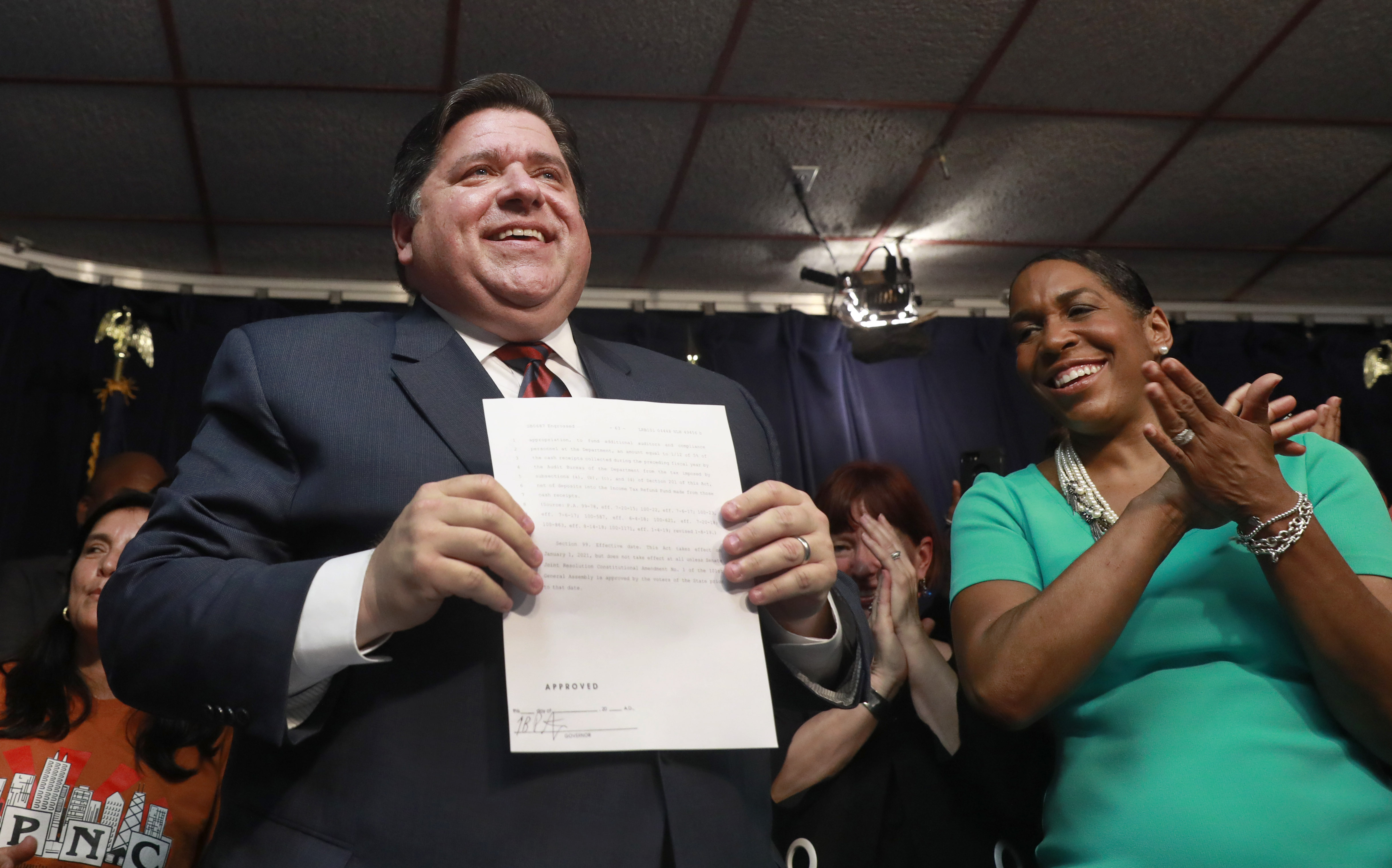Connecting state and local government leaders
Dozens of cities are changing how they collect fines and fees. How did this movement grow?
In Durham County, North Carolina, more than 20% of the adult population had a suspended driver’s license in 2017. Over 80% of those with suspended licenses were people of color, mostly African Americans, and the average time they had lived without a license was 11 years.
The Durham Innovation Team sent Chuck Manning, their community outreach coordinator, out into the city to find out why so many people were going without licenses. “People were brutally honest,” he said. “One lady had a suspended license for six years because of a seat belt violation and the fees for the ticket had built up to $6,000. She just couldn’t pay.”
So Durham tried an experiment. For two weeks, they held an amnesty period where people could text a number and potentially see their debt wiped. According to Manning, “the phone didn’t stop ringing.” More than 2,000 people applied, about 500 people were determined to be eligible and over 2,500 old charges were dismissed. “It blew my mind,” Manning said.
Manning, who also received his license back through amnesty, said that many like him had simply not had the option to pay the tickets and the late fees associated with them because they were living paycheck-to-paycheck. “It was my light bill or my license,” he explained.
Durham has since expanded their efforts into a permanent program that, in part, gives people relief without them even having to ask for help. Between December 2018 and February 2019, the district attorney’s office wiped out 50,000 old traffic cases involving 30,000 people. The city has also become part of a larger movement re-evaluating the role of fines and fees in municipal government.
City leaders across the country are taking a new approach, determining that what had once seemed like reasonable reprimands are in fact big burdens on the poor. This reassessment spread from traffic violations, like Durham’s work, to looking at the details of how bail is implemented and efforts to clear warrants on old charges for minor offenses. At the same time, dozens of cities have also eliminated library late fees in the past year and wiped resident debt to restore library cards.
In Chicago, a 2018 investigation by ProPublica Illinois found that unpaid tickets, fines and fees were driving residents, particularly poor and black people, into bankruptcy. By the end of the year, the $1.3 billion owed the city in unpaid tickets prompted the creation of the Fines, Fees & Access Collaborative to evaluate city policies that might be harming low-income residents. “Behind these numbers are real people supporting their families,” said City Clerk Anna Valencia. “We had to change the way we’re doing business.”
What Are Fines and Fees?
It’s first helpful to distinguish between a fine and a fee. A fine is a punishment for anything from a municipal code violation to a felony. A traffic ticket is a fine. The fifty cents owed to a library for an overdue book is a fine. The $500 punishment for operating a fortune-telling business in Avondale, Arizona, where that practice is illegal, is a fine.
Fees are surcharges added on top of fines, and are used to fund the court system and other government services. Typically, fees are what can make certain fines—especially traffic and vehicle-related tickets—so expensive. In Chicago, where the city recently revised its fee structure for particular types of tickets, a $200 ticket for failure to have a “city sticker” needed to operate a vehicle in the city could rise to $488 when collection and late fees were added in. The same situation plays out in California, where a red light ticket is $490—but only $100 is the base fine, with the remaining $390 made up of fees.

Running a red light in California wasn’t always that expensive. Though the base fine has remained the same for the last 20 years, fees have steadily increased. That same ticket was only $103 in 1993 and $340 in 2003. A 2018 audit found that traffic and moving violation fees generated more than $450 million each year for numerous state and county funds, including emergency medical services, court construction, and DNA identification research.
California is one of many states using fees to fund projects entirely unrelated to the tickets they’re tacked onto. New Jersey, for example, dedicates $4 million annually from moving violation fees to autism research.
States aren’t the only ones funding themselves with revenue gained from fines and fees, said Joanna Weiss, the co-director of the Fines and Fees Justice Center. The tax reforms of the 1980s and 1990s meant less revenue for states, and therefore, less revenue for cities. The 2008 recession further cut the money flowing from states to cities, while policies like property tax caps left municipal governments with fewer and fewer revenue streams to draw from.
Weiss said that led some cities to bolster their budgets with fines and fees—but that system isn’t sustainable, as residents who are hit with high charges are often low-income. “When you’re constantly hitting up poor people to prop up the government, there’s only so much wealth you can extract,” she said. “It gets harder and harder to collect money because people don’t have it.”
How Cities Became Interested in Fines and Fees Reforms
Many city officials say they were first moved to action on fines and fees by the U.S. Department of Justice’s Ferguson Report, released in 2015 in the wake of the police shooting of Michael Brown and the subsequent protests that lasted for months. Investigators found that the city’s budget was overly reliant on fines and fees collected largely from black residents, to the point where city officials “routinely” pressured police to “generate more revenue” through ticketing and collections. The report also noted that when considering new fines and fees, “there is no indication that ability to pay or public safety goals were considered.”
Muneer Karcher-Ramos, the director for the St. Paul Office of Financial Empowerment, said that the Ferguson report “really catalyzed” the discussion around fines and fees. “Cities were on auto pilot before that report,” he said. “People started asking if we’re using fines and fees the way we should be. It spurred a national awakening.”

San Francisco was at the forefront of that awakening, in large part due to community activists who pushed the city to revise its fines and fees structure.
The Bay Area city has accomplished a number of firsts in the past few years. In 2015, San Francisco Superior Court became the first jurisdiction to stop suspending licenses over unpaid traffic fines. In 2018, the city became the first in the country to eliminate discretionary court fees, including those for electronic ankle monitoring, probation costs, and collection and administrative costs, after finding that the collection rate for such fees was around 9%. In 2019, the county became the first to stop charging for phone calls made from jail.
Many of those firsts are due to the work of the San Francisco Financial Justice Project, an initiative formed in 2016 and run out of the city treasurer’s office. Anne Stuhldreher, the project’s director, organized the Fines and Fees Task Force, which for six months evaluated the pain points for residents, from towing, booting, and parking charges to municipal code violation and overdue library fees.
“I’m such a big believer in cities to make a difference in this space,” Stuhldreher said. “So when we considered a reform, we always looked if anyone else had done this around the country.”
In the beginning, there weren’t many examples from other places. But now San Francisco has become a source for city and county officials across the country. Stuhldreher said she regularly fields calls from mayor’s offices, municipal transit organizations, city council members, librarians and public defenders. “We call everyone back because I wish there had been someone to call when we started this,” she said. “Our first piece of advice for other cities is always the same: listen to what residents are telling you. Find out where they’re struggling. Then figure out what’s possible.”
But Where Will the Money Come From?
Before city officials can find out what’s possible, though, they have to deal with the most common argument made against fines and fees reform: Where will the money come from instead?
Kim Drew, the legislative advocacy director for the Heartland Alliance, was a member of Chicago’s Fines, Fees & Access Collaborative, which evaluated the city’s ticketing and collection processes in 2019. “People’s knee-jerk reaction to these reforms, especially in a city with a budget gap, was that they would result in less revenue,” she said.
Chicago officials weren’t alone. When cities call San Francisco for help, Stuhldreher said that “everyone who calls asks about the revenue impacts.” But Stuhldreher and Drew said that research shows the opposite of most cities fears—that when fines and fees are easier to pay, revenues actually increase.
When San Francisco created a new payment plan for parking tickets, for example, the Municipal Transportation Agency saw revenue more than triple in the months after the change compared to collections in the same time frame the previous year. After showing that data to Chicago officials, Drew said they were more willing to implement changes like ticket payment plans. “When people can pay, they will,” she said. “We just weren’t giving them the chance.”
Other places have evaluated the effort expended to collect fines and fees with historically low pay rates and found that collections were actually costing them. When Alameda County, California did a breakdown of the cost of collections for justice system fees, they found that they were spending approximately $1.6 million to collect $285,000, resulting in a net loss of $1.3 million. In a smaller case, St. Paul, Minnesota stopped collecting library late fees when they found that the city was spending $250,000 per year to recoup $215,000.
Lisa Foster, the co-director of the Fines and Fees Justice Center, said that more cities and counties should be doing inventories on their collections processes. “Cities should ask themselves a fundamental question: Are we actually making money off this?” she said.
In places like Alameda County and St. Paul, the answer was a clear no. But in other places, fines and fees can make up a massive proportion of the city budget. A 2019 report by Governing found nearly 600 municipalities rely on fines and fees for at least 10% of their budget, with the worst offender, a village in Louisiana, pulling in a whopping 92% of its general fund from fines and fees.
Foster said that while larger cities have alternatives like higher sales and income tax or a tourism industry, smaller cities and towns are left in a tougher situation. “Somebody has to repair potholes,” she said. “For them, the solutions are more at the state level.”
One option for smaller cities is to consolidate and regionalize certain services, like police forces and firefighters. They can also band together and lobby the state legislature for higher disbursements so that they wouldn’t have to be so reliant on fines and fees.
In some places, cities are also calling on the state to eliminate laws that prevent them from implementing more progressive revenue structures. In Illinois, for example, one of only 11 states with a flat income tax, voters in November will decide on a ballot measure to allow a graduated income tax system, which estimates say would bring in an additional $3.7 billion to state coffers. In a city like Chicago, which has been trying to wean itself off of the 8% of its revenue obtained from fines and fees, extra money could help fill the gap.

But ballot measures and legislative funding are still an uncertain future, said Weiss from the FFJC. “While we wait for state-wide solutions, cities can act and help people on the ground now,” she said.
Momentum for the Future
As the number of cities attempting to revamp their fines and fees policies have grown, so too have the number of resources available to them.
The National League of Cities in April of 2019 launched a program called Cities Addressing Fines and Fees Equitably to help municipal leaders “understand the landscape,” from those related to criminal justice and traffic to water utilities. Denise Belser, program director of economic opportunity and financial empowerment at the NLC, said that having leaders from cities like San Francisco and Chicago serve as “faculty” helps spread their reforms. “We can have the smartest experts tell them how to do it, but cities learn best from each other,” she said.
The Fines and Fees Justice Center, in partnership with the San Francisco Financial Justice Project, also launched its own network for cities in December. Foster from FFJC said that the movement only has the potential to grow in the coming months and years. “We think that having a group of leaders show that the sky doesn’t fall when you do these reforms will lead other cities to take action, too,” she said.
Issue-specific networks are also growing, inspired by the work of cities like Durham. What Works Cities in November launched a network to help cities tackle the issue of debt-based driver’s license suspensions, often the result of unpaid fines and fees. Ellen Hur, a special advisor to WWC, said that it’s important for cities to work together, but their primary responsibility is to their constituents—so advocacy and advisory groups should step up now. “The more cities we engage, the more people’s lives are affected for the better,” she said.
Manning from Durham said that cities need to look inward first before they embark on reforms. “It’s all about community engagement,” he said. “Go out and hear from the people.”
Emma Coleman is the assistant editor for Route Fifty.

NEXT STORY: Proposed Federal Rule Will Undercut State Lending Protections, AGs Warn




